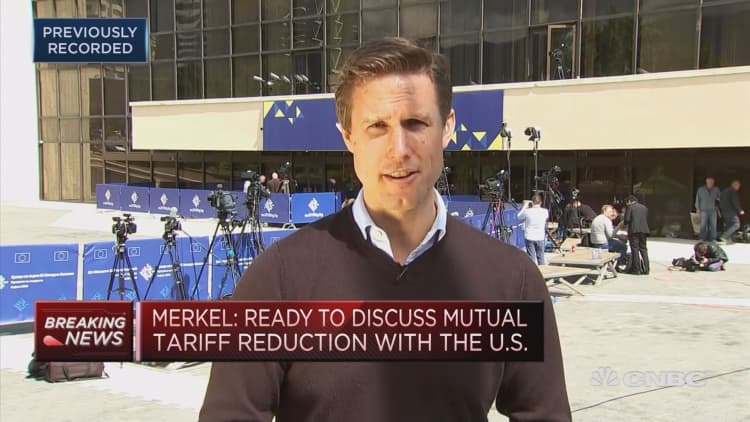
Germany's Chancellor Angela Merkel has signaled that the European Union is willing to discuss reducing trade tariffs with the U.S., but only if the measures are reciprocal.
Merkel also added that those discussions would only happen if the U.S. ensured the EU was permanently exempted from import tariffs on metals that President Donald Trump announced in March.
"We have a common position. We want a permanent exemption and then we are ready to talk how we can reciprocally reduce the barriers to trade," Merkel said, according to Reuters, as she arrived at a summit of EU leaders in Sofia, Bulgaria Thursday.
Trump imposed import duties of 25 percent on steel and 10 percent on aluminum but granted EU producers a temporary exemption until June 1.
Merkel's comments mark a shift in her, and Europe's, position over trade tariffs and import duties that Trump said were necessary for "national security."
Previously, the EU's trade commissioner said the tariff proposals were tantamount to "threats" and "bullying" while the Belgian Prime Minister Charles Michel and French President Emmanuel Macron likened the temporary extension to having a "gun to our head," Reuters reported in March.
'Friendlier tone'
Reacting to the comments, the chief economist and head of GAM Investment Solutions told CNBC he didn't think Europe's offer would be enough to sway Trump.
"I think the key word in her statement was 'reciprocal' and the Americans are looking for something unilateral. They want the Europeans to cut some tariffs to open up some opportunities in exchange for this permanent exemption," Larry Hatheway told CNBC's "Squawk Box Europe" on Thursday.
"But she used the word 'reciprocal,' in other words, 'we'll lower our tariffs if you lower yours' — well, that's not really offering the Trump administration very much. Yes, it's a friendlier tone perhaps than the Japanese are adopting at the moment but nevertheless it's probably not good enough," he said.
Meanwhile, German economist Carsten Brzeski said the comments revealed Merkel's trademark pragmatism.
"On Merkel, this is again her very pragmatic approach," Brzeski, chief economist at ING, told CNBC in an email.
"(You) could call this 'trade before pride' and it makes sense. It is Merkel's strength to get emotions out of a debate. In the trade conflict, looking at the facts, focusing on each other's arguments and trying to find a compromise," he said.
Noting that her comments were a far cry from her colleague French President Emmanuel Macron's "gun to the head" comments, Brzeski said Merkel "has waited a bit until most (of her) alpha male colleagues have calmed down" before commenting.


